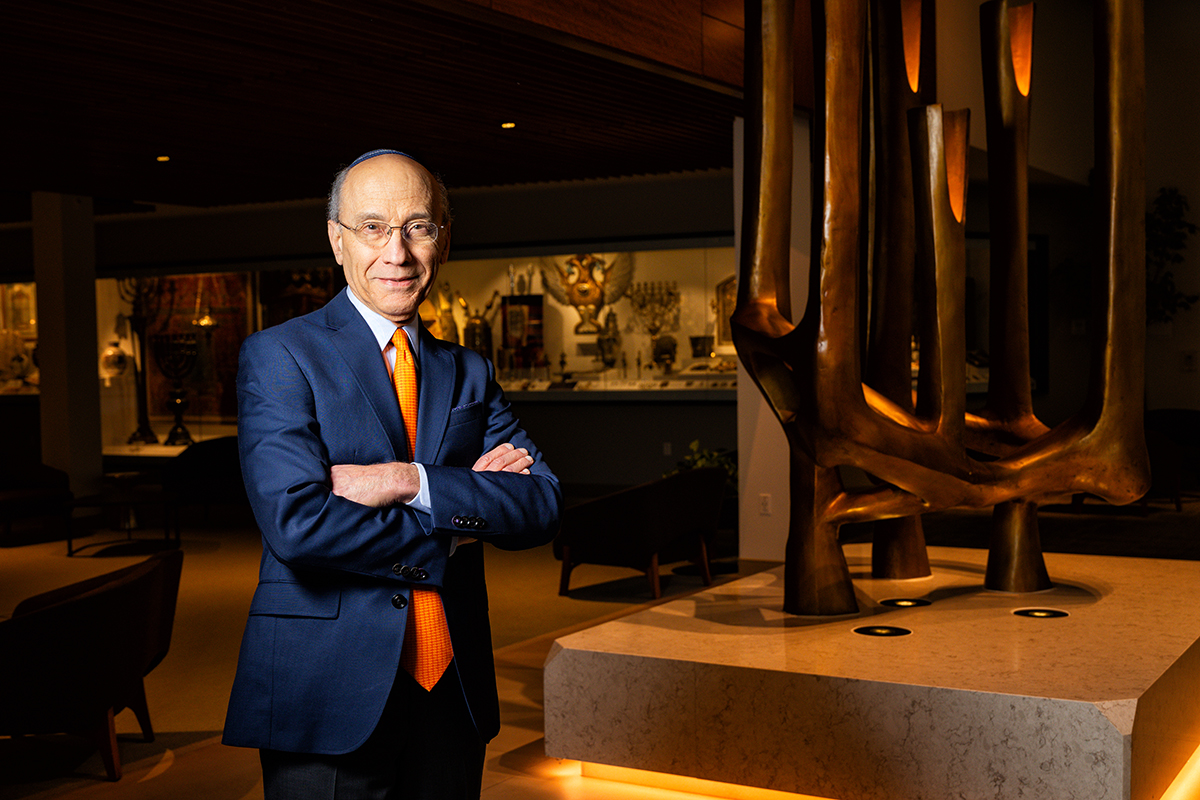Jake shoots me a look.
It’s July 3rd at Kauffman Stadium, late in a game against Tampa Bay. Jake Eisenberg, young play-by-play man for the Kansas City Royals, is describing the top of the eighth inning. Richie Palacios bats against James McArthur. The Royals are up 4-2. There are two outs, but the Rays have a man on. Eisenberg describes Palacios as the “potential tying run,” then turns in his swivel chair and shoots a look my way.
He does it as a little joke. Three hours before, during our interview in an auxiliary broadcast booth overlooking the field, we talked about the self-described logophile’s love of words. I asked about an addition he often makes to an especially common formulation in sports broadcasting: the word “potential.”
Since the dawn of time—or at least the dawn of radio—baseball play-by-play announcers have been describing players as “representing” things, usually the tying or winning run. Esienberg adds “potential.” As in “the potential winning run is on first.” He is correct to do so. That hypothetical runner on first, for instance, could certainly come around to score, but he also could “represent” the first out of a double play.
It’s a small thing, granted. But it’s indicative of Eisenberg’s extraordinary commitment to the accurate and effective use of language.
I was surprised when he shot me that look, though, because I’d become mesmerized watching him and partner Steve Stewart call the game. It’s a consuming thing, calling a baseball game. Over the course of two hours and 43 minutes, I watched Eisenberg, Stewart and producer and engineer Eric Guthrie create a theater of the mind. Eisenberg in particular always seemed in motion. Headset on, overlooking the field, he’d lean forward on his desk, then back again, twirl a pen, jiggle a leg or tap a foot. Open laptop to his left, cell phone and binoculars in front, he took notes, gestured and reacted to big plays. He read live promos on the air. He constantly consulted a specially designed scorecard covered with tiny, insanely meticulous notes handwritten in four colors, representing a truly gobsmacking level of preparation. At one point, he came up with an idea for a comment about reliever Angel Zerpa, researched it on a site called Baseball Savant and seamlessly relayed it over the air.
The casual virtuosity of it all was hypnotic. The fact that he still had the presence of mind to turn and share a silent, little joke—particularly during a tense part of the ballgame—was almost shocking. Imagine, for instance, a great actor in the middle of a dramatic monologue stopping to give you a wink that no one else can see.
It was a remarkable level of poise, particularly for a guy who’s not yet 30. In fact, when the Royals hired Eisenberg in late 2022, filling the seat left by Steve Physioc’s retirement, Eisenberg was the youngest play-by-play man in Major League Baseball. I soon found myself searching for the secret to his rapid rise. How, exactly, does someone so young get such a prestigious and demanding gig?
Talent comes first, of course, and Eisenberg has it. His delivery is musical and fluid. His language is sharp, crisp and strong. He has a particular gift for setting a scene, describing the look of a player’s uniform, the feel of the evening air or the quality of light on the field.
He also has a willingness to get better. Seriously. It would be difficult to overstate the amount of work this man pours into the perfection of his craft. We talked about that dedication and much more during the friendly, pre-game hour or so we spent in conversation.
“I think about it maybe more than I should,” he said.
He wore a powder-blue polo shirt, navy slacks and white sneakers with ankle socks. His face was round. His eyes were piercing blue. His smile was boyish. You see that boyishness when he posts pictures of himself at Fenway, Yankee Stadium or some other shrine of the game. It’s a happy grin, like he can’t believe his good fortune.
“I dissect these broadcasts to a molecular level, for better and for worse,” he said. “Like, the thing that I think about and harp on the most is when there’s a ball put in play. I think about the syntax of what I’m saying, that it’s to the ear grammatically correct. Speaking in an active voice and present tense.”
He demonstrated this “molecular” dissection for me after the game. As fireworks exploded behind us, we listened to the replay of his call on the evening’s signature play: Kyle Isbel’s dramatic and potentially (wink) game-saving, wall-bashing, snow-cone catch in centerfield. Eisenberg took the call apart for me, analyzing his performance sentence by sentence, word by word.
Maybe, I thought, his secret is in his background.
He, and a twin sister Taylor, come from a baseball-loving family in Port Washington, New York, less than an hour from where the Mets play in Queens. Eisenberg is not, however, the scion of an already-famous broadcaster like Joe Buck, Kenny Albert, Chip Caray or Todd Kalas. His dad is a neurosurgeon, his mom a dietitian and nutritionist.
Eisenberg always loved the game, but he wasn’t one of those kids who turned the volume down on a broadcast and did their own play-by-play into a wooden spoon—a common trope in broadcaster origin stories. He did some broadcasting in high school on the student radio station, but didn’t really do play-by-play baseball until he got to college at the University of Maryland.
Once there, he did one game as a freshman. He covered a handful more, maybe eight to 10 as a sophomore, after he and a few friends created the Maryland Baseball Network, a multi-platform media home for the Terrapins.
“We were there to do every single game—home, road—podcasts, articles, the whole nine yards that, frankly, was as close to a professional operation as a student operation could be,” he says.
That same sophomore year, he met Jen, who would eventually become his wife. They were married in January of this year.
Eisenberg called a lot more Maryland games as a junior and then covered Cape Cod League baseball the summer of his junior year. Ultimately, he spent five seasons broadcasting minor league ball, including stints in Brooklyn, Winston-Salem, Richmond and at the Royals’ Triple-A affiliate in Omaha. He also called more than 40 games for the Mets and even worked a few with his biggest influence, storied Mets announcer Howie Rose—the broadcaster Eisenberg grew up listening to.
Eisenberg raved about Rose. “He could not have been kinder in extending his contact information for me to ask him questions and send some tape and get some feedback, and he would give me active, tangible feedback on the tapes,” he said.
“What sort of feedback?” I asked.
“One of the notes that he gave me is I had the instincts of describing uniforms or describing a way a pitcher was set on the mound or the way a batter was positioned in the box. But I wasn’t sharing those details with purpose. I was kind of throwing them at the wall like a Jackson Pollock. They were being shared to fill space that I thought I had to fill.”
He learned to use those sensory details for dramatic effect in, for instance, the bottom of the ninth in a close game.
“That’s when it’s time for you to tell the audience that the pitcher is staring into his catcher’s mitt and there’s a bead of sweat dripping down over his right eyebrow, and the batter is gripping the bat a little bit tighter,” Eisenberg said. “Those are the moments when you build the tension. If I tell you that in the bottom of the second inning, when there’s bases empty, one out, it doesn’t hit the same way.”
I asked what else makes Rose so good.
“It’s vivid. It’s sharp. It’s situationally aware.”

“What does that mean—situationally aware?” I asked.
“A way of knowing what’s going to happen before it happens or just understanding the situation immediately,” said Eisenberg.
Fabled Royals broadcaster Denny Matthews has a high level of situational awareness, too, Eisenberg told me. He spoke of Matthews, who was unfortunately absent on the day of my visit, with the sort of reverence that a young musician might use to describe The Beatles. The comparison is apt, in fact, not only because Matthews is among the best ever at his craft but also because Matthews started calling Royals games in 1969, when The Beatles were still making records—an almost unfathomable longevity.
“So much of what a broadcaster does is mentally preparing for something that they might see,” Eisenberg said. “Everything happens so spontaneously and instantaneously that we’re effectively blind-reacting to the thing that’s happening. But if you have some sort of precognition to simultaneously describe, ‘here’s the 2-2 pitch,’ and also have this weird daydream about what that 2-2 pitch might end up being or might end up going, you’re just maybe a fraction of a second better prepared to call the moment that’s to come. And every now and again, I get these feelings. And I’m guessing that Denny gets these feelings all the time.”
As the game’s first pitch grew closer and more people started stirring on the field below, we covered other aspects of the job. Eisenberg talked about the differences between broadcasting for TV and radio. He described using chest voice instead of head voice for a richer tone. He spoke of striving for a “controlled pace” and bringing one’s personality to the fore. He mentioned his Buddha-like mantra of “Be where your feet are,” an aphorism about staying focused on the task at hand. He talked about overcoming “broadcaster voice,” the kind of cliched, exaggerated tone lovingly pilloried by the likes of Hank Azaria in Brockmire and Bob Uecker when he deliberately hammed it up for Major League.
Everything Eisenberg said in our interview made sense. Every question was affably answered. Despite that, and even after spending an evening in the broadcast booth, I couldn’t shake the feeling that I was missing some key element to his success. Yes, there is talent. Loads of it. Sure, there’s a fantastic work ethic and a commitment to excellence. He’s a kind man, too, which matters in everything. All of it contributes, but I couldn’t escape the idea that I was missing some final, mysterious ingredient.
Then I remembered the rainbow.
It was the bottom of the fifth in the game against Tampa. The day had been overcast, but the clouds parted at sunset. A burst of horizontal light hit the Blue Moon billboard in right field. A moment later, a vivid double rainbow appeared above the right field wall, crisp and radiant against a murky cobalt sky.
A strange and happy sensation swept through the park. Everyone felt it. It was a sign. We knew the Royals were going to win. Which, a few innings later, they did.
It was one of those oddly beautiful sports moments that every fan knows—a flash of synchronicity when a team, crowd, city and the natural world itself all seem to merge into a kind of mystical force. You get a vibe. You just … believe. It’s the same energy that makes us think wearing our lucky socks or sitting in a certain chair can impact a game that’s being played a thousand miles away.
Moments like that are when baseball becomes more than just an athletic endeavor. These are the ideas that Bernard Malamud wrote about in The Natural and W.P. Kinsella touched on in The Iowa Baseball Confederacy and Field of Dreams. It’s a kind of magic, really, where faith and superstition meet, when the game rises to the level of near-religion.
I thought back to what Eisenberg said about the “weird daydreams” and the precognition that great broadcasters can have. I remembered how he didn’t want it quantified. Maybe, I thought, that’s his secret. Eisenberg seems to have great reverence for the unknowable, enchanted parts of baseball.
That led me to another thought. Something far simpler. I remembered the gleeful way he smiles for pictures at the ballpark. I thought of the excitement that pours from the radio when he’s calling a game and his sheer, authentic joy when the Royals win. At heart, I realized, he is simply a great fan of this strange, beautiful, magical, intensely demanding game. That might be the greatest secret of all.
“That’s when it’s time for you to tell the audience that the pitcher is staring into his catcher’s mitt and there’s a bead of sweat dripping down over his right eyebrow. Those are the moments when you build the tension” –Jake Eisenberg





